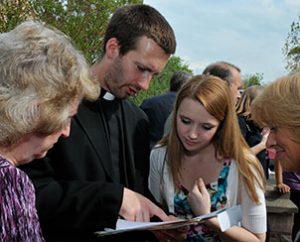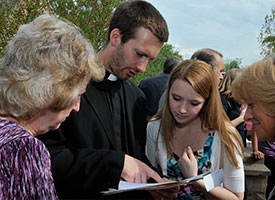By Joe Isenhower Jr.
FORT WAYNE, Ind. — During its April 27-May 1 meeting, the LCMS Council of Presidents (COP) — in its role as the Synod Board of Assignments — assigned first pastoral calls to 138 men.
In addition, 103 vicar candidates were assigned, as well as 64 commissioned ministers (including eight deaconesses).

The COP held its meeting here April 27-30 and then traveled to St. Louis for call and assignment services there May 1. Vicarage assignments (along with deaconess internships) and pastoral calls were announced during worship services at Concordia Theological Seminary (CTS), Fort Wayne, on April 29 and 30, respectively, with Fort Wayne deaconess assignments announced at a May 16 service.
Those receiving pastoral calls included a student from Concordia Lutheran Theological Seminary in St. Catharines, Ontario, Canada; two from the Ethnic Immigrant Institute of Theology (a distance-education program based at the St. Louis seminary); one from the Center for Hispanic Studies (also in St. Louis); one from the Cross-Cultural Ministry Center at Irvine, Calif.; and three who completed the Synod’s colloquy process.
Two pastor candidates were released for ministry in Lutheran Church—Canada and the Lutheran Church of Australia.
The Rev. Kurtis D. Schultz, chairman of the COP Placement Committee and president of the LCMS Southern District, told the COP, “You’ve heard the term ‘it takes a village.’ Our placement process takes the whole church to be able to work through the task of placing the Lord’s workers into the field. There are so many people who are a part of this joyful process, beginning with the congregations of the church body.”
He then introduced and thanked the members of the placement committee and placement teams from the two seminaries.
Schultz indicated that after all the available spring vicarage candidates received assignments, 29 vicarage requests remained unfilled.
“Even though the number of pastoral-candidate calls submitted this spring were almost 50 percent less than the number submitted five years ago,” he said, “20 of the calls remained unfilled, since they did not match the remaining pastoral candidates who did not receive assignments.”
“Call Day brings joy and a renewed sense of purpose to both seminary communities,” commented the Rev. Dr. Glen Thomas, the Synod’s executive director of pastoral education. “Since the number of calls submitted exceeded the number of candidates available this year, I continue to urge the church to be active in identifying, informing and encouraging appropriate candidates for the pastoral ministry.”
The COP held its annual meeting with the CTS faculty throughout the afternoon of April 28. The council met with the St. Louis seminary faculty in February. Each year, the COP meets with both faculties.
Also, the COP continued its ongoing study of two topics — ecclesiastical leadership in a post-church culture and of the office of the public ministry — and heard a number of reports on other topics.
Faculty, COP meeting
The Rev. Dr. Charles A. Gieschen, academic dean and professor of Exegetical Theology at CTS, welcomed the council on behalf of seminary President Rev. Dr. Lawrence R. Rast Jr., who was out of town visiting an LCMS congregation the day of the joint meeting.
Gieschen introduced other CTS faculty members who addressed the COP on a number of developments at the seminary, including:
- the Rev. Dr. James G. Bushur, assistant professor of Historical Theology and director of Deaconess Studies, on the CTS deaconess program after 10 years.
- the Rev. Dr. Carl C. Fickenscher II, professor of Pastoral Ministry and Missions, dean of pastoral education and certification and supervisor of the seminary’s Specific Ministry Pastor (SMP) program, speaking about the seminary’s SMP program.
- the Rev. Dr. Gifford A. Grobien, assistant professor of Systematic Theology and supervisor of the seminary’s Doctor of Ministry program, on the redesign of that program.
All three men emphasized the seminary’s commitment to excellence for each of the programs; and Fickenscher and Grobien stressed the importance of making sure that SMP and D.Min. students become part of the CTS community — especially while engaged in distance education.
In a written report for the COP, Rast mentioned several matters covered in the faculty presentations, and also touched on other developments at CTS, including faculty additions, “very active recruitment,” continuing education, “outstanding contextual learning opportunities,” “expanded missional formation opportunities,” continuing “international mission outreach,” “needs for pastoral formation in Spanish,” “our concern for the financial well-being of students” and the seminary’s “10-year accreditation.”
Topics of discussion during the joint faculty-COP meeting were:
- “How districts and seminaries can work together in initial screening of seminary applicants,” with COP Chairman and LCMS Pacific Southwest District President Rev. Dr. Larry Stoterau providing background about the LCMS Seminary Admission Task Force. Thomas and other task-force members then highlighted recommendations to date, followed by small-group discussion and feedback on the topic.
- Issues related to the work of the Synod task force on 2010 LCMS convention Resolution 5-05A, which addressed certification and an accountable system of continuing education. The Rev. Dr. Dale L. Sattgast, South Dakota district president, and Southern District President Schultz led discussion of the continuing-education aspect of the resolution — specifically, how districts and seminaries can work together for the continuing education of pastors.
“It’s wonderful to have such face-to-face opportunities to nurture the relationships between members of the Council of Presidents and individual faculty members” Gieschen told Reporter after the joint meeting. “These annual meetings have proved helpful for discussing items of mutual concern.”
President’s report
In his report to the council, Synod President Rev. Dr. Matthew C. Harrison touched on a number of areas.
He spoke of the 40-year trend of declining membership totals in the Synod and said, “I still have yet to find anything to challenge my basic conviction that our children are getting married later and having far fewer children. And I think that demographic is most exacerbated where the church is in decline.” He especially noted the need to reach the “nones” — the growing numbers of young people who say they believe in God but do not associate with organized religion.
Harrison also mentioned the need for accurate and coordinated records-keeping and reporting of demographics in the Synod, including the need to track trends and support ministries of congregations in rural/small towns, urban/inner-city and suburban venues — a priority of the LCMS Office of National Mission.
He provided a rundown of topics that might be addressed by floor committees for the 2013 Synod convention and touched on ecumenical dialogues and discussions with leaders of a number of church bodies in agreement with the Synod on matters such as freedom of religion and opposition to same-sex marriage.
In a separate report, Harrison spoke about the major three-year study of the Synod’s Constitution that was mandated by Resolution 8-30B of the 2010 Synod convention, and for which the “Church Fellowship” website at lcms.org/churchfellowship was formed to provide resources.
“My purpose today is to consult with you, to hear your suggestions, before we get into the next triennium, when we’ll prepare the study to work through it all.”
Members of the Council of Presidents then offered comments and suggestions for the study.
COP Chairman Stoterau began discussion about the meaning and ramifications of pastors as “overseers above reproach” — another ongoing topic before the council.
Discussion on “above reproach” spanned a number of topics, including the COP’s zero-tolerance policy regarding sexual infidelity to use of the Internet when Christian pastors and others malign the reputations of individuals.
Other presentations
Others making presentations to the COP included:
- CTS’ Grobien, who led a Bible study on “excellence: personal and professional.” That was the theme for the meeting, under the COP’s ongoing attention to “ecclesiastical leadership in a post-church culture.”
- Southern Illinois District President Rev. Timothy Scharr, leading a confessional study on the reading of The Augsburg Confession.
- Montana District President Rev. Terry Forke, who led discussion of the COP’s ongoing study of “The Office of Public Ministry.”
- Dr. Thomas E. Cedel, president of Concordia University Texas, in Austin, who also spoke on “excellence in leadership.”
- Office of International Mission Executive Director Rev. Randall Golter, speaking on what he terms the “Gospel gap paradigm: an ecclesial missiology.”
- the Rev. Doug S. Seletzky, director of ministries for Community of Hope Lutheran Church in Brecksville, Ohio, who related how that congregation reaches the unchurched. Introducing him to the COP, Ohio District President Rev. Terry L. Cripe said Seletzky “has been a great outreach worker for the district.”
Vacancies
LCMS Eastern District President Rev. Dr. Chris C. Wicher, who is secretary of the COP, provided statistics on vacancies reported by all 35 district presidents — not counting the spring placement of new church workers.
Wicher indicated that 324 congregations were reported as calling sole pastors; 33, senior pastors; 83, associate or assistant pastors — for a total of 440 congregations calling pastors.
Wicher also reported that since the Feb. 16-19 COP meeting, LCMS districts had reported seven new starts and five closures.
The next regular meeting of the LCMS Council of Presidents is Sept. 13-18 in St. Louis, in conjunction with the installation of Synod officers on Sept. 14.
